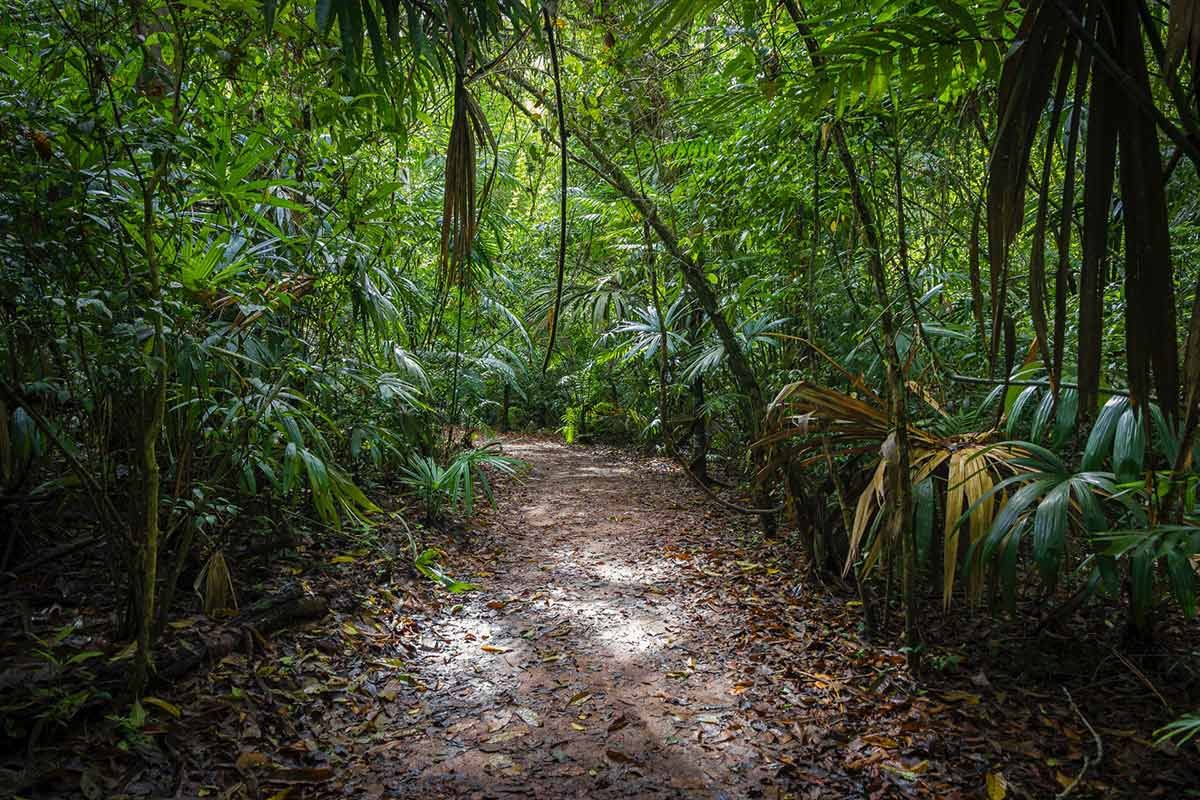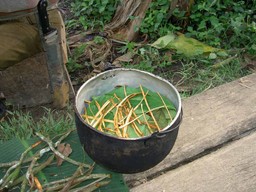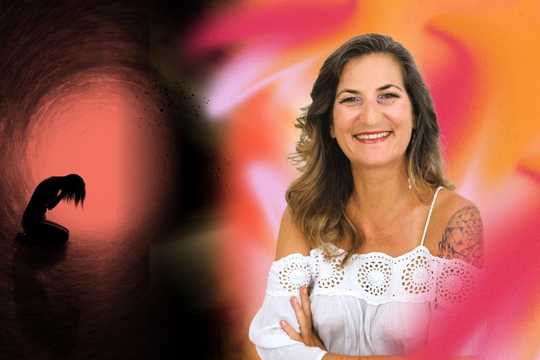Ayahuasca medicine can be a powerful healing experience, but how does it intersect with therapy? Join Olivia Clear, APCC, as we learn more about how therapy and ayahuasca medicine can work together to support healing.
It’s no secret that the Western world is in pain from an illness of disconnection marked by mounting rates of trauma, anxiety, and depression. In our search to soothe our aching psyches and souls, there’s an increased interest in working with plant medicines, entheogens, and psychedelics. Researchers and the medical community are responding with heightened openness to this type of healing that hasn’t existed since the mid-1900s in the United States [1]. I’m a psychedelic-friendly and trauma-focused therapist in Oakland, CA, where lawmakers recently decriminalized (not legalized) many plant medicines. With this change, information about Ayahuasca ceremonies is becoming more accessible. I find this an exciting time to be exploring how non-ordinary states, such as those brought about by Ayahuasca use, might be able to support the collective healing journey.
What is Ayahuasca Medicine and What Does it Have to Do with Therapy?
Researchers hypothesize that Ayahuasca, a plant medicine brew containing the psychedelic substance DMT, may have a healing effect on trauma [2]. Ayahuasca is a sacrament in indigenous Amazonian ceremonial healing and is becoming better known in Western society [3].
Despite the factors that contribute to a sense of disconnection between therapy and Ayahuasca medicine work, I believe that it’s possible for the therapeutic relationship to humbly offer respectful support for people engaging in therapy and Ayahuasca medicine work. Working with Ayahuasca can invite really big experiences. Psychedelic friendly therapy can offer a supportive space for clients to prepare for and integrate these experiences. Psychedelic-informed therapists can support inquiry, create spaciousness for expanded narratives, and help participants prepare to engage deeply with the medicine.
When seeking more information to support my Ayahuasca-curious clients, I considered the divide that exists between many communities and healing practices and the field of psychotherapy. Therapy is a common tool for those seeking healing from trauma, so I hope the field of psychotherapy will develop more inclusive and collaborative relationships with a variety of healing practices and communities. One of my first steps toward building these relationships is to follow my curiosities and my clients’ queries toward further educating myself, then offering to share what I learn with my community.
Diving Deeper
I believe one of the best ways to engage in this education process may be through direct experience of working with medicines in a legal setting, but Ayahuasca is not a medicine I’ve personally received a call to work with. Instead, I asked members of my community about their experiences, read some research, and watched documentary footage about Ayahuasca medicine.
Still, I felt like a perspective was missing as I continued to explore how people use, relate to, and work with Ayahuasca. I reached out to a member of my integration community, Sergio Sáenz, to see if he could tell me more about working with this medicine.
Sergio Sáenz: Air Force Vet and Ayahuasca Medicine Facilitator
Sergio recently began a nonprofit church, Soulnos, Inc., which is a 508c1a nonprofit “faith-based organization providing entheogenic ceremonial experiences for its members who seek to commune with the spirit realm & Source.” I was particularly interested in a witness’ perspective on how trauma shows up in an Ayahuasca ceremony and how I might be able to provide additional support.
While Sergio and I both work with trauma, I wasn’t sure how much overlap we’d have in the way we talk about and approach healing. We met at a year-long training for psychedelic-related work but this conversation was the first time I heard much of his story. Sergio is a veteran of the Air Force who works with veterans healing from PTSD. Meanwhile, my practice focuses on serving individuals who’ve experienced sexual and relational trauma.
Curious to hear more about his experience, I asked Sergio about how his path brought him from veteran seeking healing to Ayahuasca facilitator and integration coach. After returning from two years of deployment in Afghanistan with the Air Force, he recognized that he had unfamiliar feelings of social anxiety, hypervigilance, and chronic pain. It was clear the symptoms were unlikely to go away without support, so he started a course of treatment with antidepressants and therapy.
Sergio continued to suffer and started using alcohol and other substances to cope with his symptoms. In 2019, he was desperate for help returning to a life without these “torturous” symptoms and was ready to try alternative treatments.
Sergio found information about Ayahuasca as a medicine used by some to work with trauma and soon he joined a weekend of three ceremonies. He described the sort of quickly transformative healing experience that captivates the collective sense of longing evoked in many of us seeking well-being through psychedelics. He developed a curiosity to learn about working with this medicine and felt called to work with others on a similar path.
Sergio began to volunteer as a preparation and integration coach for Warrior Quest USA, an organization that funds “sponsorships and travel expenses to retreat centers specializing in helping vets overcome treatment-resistant PTSD.”
Trauma and Ayahuasca Medicine
Sergio discussed that the veterans he works with are frequently narrowly focused on the narrative of what happened when they begin working with him, and he described how it can create a dynamic of feeling stuck in the past traumatic event instead of focusing on the healing work that they would like to pursue. “Trauma is a part of your life experience and it also shapes who you are today and you can use it to strengthen yourself without getting hung up on the memory,” Sergio said.
Therapy can help clients prepare for ceremonial work by first facilitating an exploration of the narrative, then of the impacts, beyond the story. Survivors can name how the impact of traumatic events has shaped their lives and the emotional states they are likely to experience as a result of the trauma. Then they can begin to develop a willingness to engage with a broader perspective surrounding their history of traumatic experiences. This preparation work can help build a sense of safety for a deeper examination of the past and offer validation and normalization of emotional experiences. We can work together to invite a greater sense of psychological flexibility by helping inspire an understanding that the narrative is only one lens through which to view the trauma.
Challenges for Trauma Survivors
In addition to helping build flexibility surrounding the story of the traumatic event and willingness to engage with emotions related to the event, the relationship with the body tends to shift post-trauma because the body holds our traumatic memories [4].
Sergio said, “One thing that’s challenging with veterans is that their resistance to the medicine is uncanny in some cases. They’ll sit there and resist. You’ll see them tensing up and flexing and shaking their heads to get themselves out of their trance.” Sergio explained that the same hypervigilance that kept veterans alive in a war setting can keep them from healing because their training causes them to resist letting go. I thought about how these veterans use their version of somatic (body-based) grounding tools. There are many challenges for trauma survivors in attuning to the internal world over the external world, in a search for cues of danger.
In preparation work, I encourage clients to explore somatic practices to help them reground when they are experiencing the potential to dissociate from themselves. This response can strengthen their connection with a sense of engagement with somatic memories of trauma and encourage connection to the self in the present moment. However, if used during a journey, it can also dampen the intensity or depth of a psychedelic experience by prioritizing a sense of control instead of receiving or surrendering. Over-grounding can take the guidance of the experience away from the inner healing intelligence and into the mind, which can keep one from the depth of the experience.
“They’re trained not to show signs of weakness and a huge part of healing with plant medicines is vulnerability,” Sergio said. He talked about how letting go of resistance allows participants to use many other non-hypervigilant skills that become accessible such as dancing, self-massage, talking aloud, or receiving support by “being visited by elders or ancestors who speak them through their situation.”
How Therapy Helps
Therapy can provide a space for people to acknowledge that it may be tough to enter an altered state when our instincts are telling us that we need to protect ourselves. Preparing for a ceremony could include honoring the self-protection skills used to keep themselves safe. Preparation work could also focus on inviting in the realization that they have many skills that may be more appropriate or beneficial to use in healing work. The therapeutic relationship can encourage practices that promote a sense of movement or joy that can be used as tools on a medicine path.
For those who have a mental health diagnosis, an ongoing therapeutic relationship may offer an additional sense of safety. Your therapist will have an idea of how you’ve engaged with them in the past, which can help them decipher changes in behavior that may seem subtle or unnoticeable to others in your life. They can assess for symptoms that may indicate issues of concern such as a manic episode, suicidality, or psychosis. If needed, they can offer resources or referrals to help you manage new symptoms or treat the recurrence of others.
Other Common Challenges
Knowing that feeling safe can lessen the need for hypervigilant behaviors, I was interested in hearing more about common challenges people encounter when trying to develop a sense of emotional safety during a ceremony. I was aware that many Ayahuasca ceremonies happen with a group of virtual strangers so I asked about the impact of this aspect of the experience. He explained that a lack of familiarity can make other group members’ healing expressions, sounds, or movements – a natural part of the work – feel distracting or puzzling.
I also think about the importance of encouraging community building around this work by engaging in preparation and integration groups before and after the experiences, so participants can connect with one another and potentially develop ongoing relationships on a deeper level. There’s so much potential benefit in sharing our histories, connecting via experiential healing, and holding space for one another.
There’s an innate wisdom in all people known as the “inner healing intelligence” that holds an understanding of how to heal. Therapists could educate clients about this transpersonal psychology concept and remind clients that other ceremony participants have an inner healing intelligence guiding them as well. Each person has their own process of engaging with themselves, and we can learn to honor this part of one another.
Ayahuasca is made with two main ingredients, but there may be different plants or herbs included based on the preparer’s recipe, so Sergio recommended that anyone who takes medications or uses substances and plans to sit for a ceremony should have a conversation with the preparer of the Ayahuasca brew. Asking about chemical interactions may evoke shame in users of substances seen as less-than in a lens of substance exceptionalism that frames psychedelic substances as more acceptable. Many people also have internalized societal stigma associated with antidepressants which can make conversations about drug interactions uncomfortable.
Therapists can support clients by holding space for these fears and anxieties and normalizing concerns about sharing vulnerable information. When therapists encourage tough conversations, participants can obtain the information they need to make well-informed decisions and take what may be their first steps toward building a sense of safety in engaging with the shaman.
Where to Begin
It’s important to know that not all therapists can support Ayahuasca work, as we are required to practice within our scope of competence and this requires additional training beyond what most graduate schools teach. Additionally, there are legal and ethical limitations for those with professional licensure. If you currently see a therapist, you may want to consider finding out if they are trained in psychedelic preparation and integration. If you would like to engage with a psychedelic friendly therapist but have not found one yet, Psychedelic Support has a list of providers.
References
- Yaden, D. B., Yaden, M. E., & Griffiths, R. R. (2020). Psychedelics in psychiatry—keeping the renaissance from going off the rails. JAMA psychiatry.
- Inserra, A. (2018). Hypothesis: the psychedelic ayahuasca heals traumatic memories via a sigma 1 receptor-mediated epigenetic-mnemonic process. Frontiers in pharmacology, 9, 330.
- Frecska, E., Bokor, P., & Winkelman, M. (2016). The therapeutic potentials of ayahuasca: possible effects against various diseases of civilization. Frontiers in pharmacology, 7, 35.
- Levine, P. A. (2010). In an unspoken voice: How the body releases trauma and restores goodness. North Atlantic Books. [Google Scholar]







